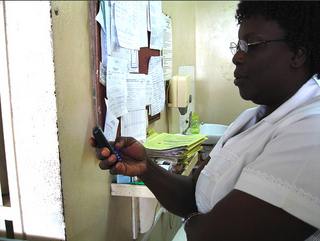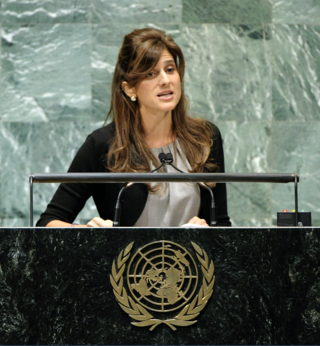A health system, health care system or healthcare system is an organization of people, institutions, and resources that delivers health care services to meet the health needs of target populations.
Women's health differs from that of men's health in many unique ways. Women's health is an example of population health, where health is defined by the World Health Organisation as "a state of complete physical, mental and social well-being and not merely the absence of disease or infirmity". Often treated as simply women's reproductive health, many groups argue for a broader definition pertaining to the overall health of women, better expressed as "The health of women". These differences are further exacerbated in developing countries where women, whose health includes both their risks and experiences, are further disadvantaged.

Preventive healthcare, or prophylaxis, is the application of healthcare measures to prevent diseases. Disease and disability are affected by environmental factors, genetic predisposition, disease agents, and lifestyle choices, and are dynamic processes that begin before individuals realize they are affected. Disease prevention relies on anticipatory actions that can be categorized as primal, primary, secondary, and tertiary prevention.

Julio José Frenk Mora is president of the University of Miami and has served in this role since 2015. He is the University of Miami's first Hispanic and native Spanish-speaking president. At the University of Miami, he is also a professor of public health science at the university's Leonard M. Miller School of Medicine, professor of health sector management at the university's Herbert Business School, and professor of sociology at its College of Arts of Sciences.

Health human resources (HHR) – also known as human resources for health (HRH) or health workforce – is defined as "all people engaged in actions whose primary intent is to enhance positive health outcomes", according to World Health Organization's World Health Report 2006. Human resources for health are identified as one of the six core building blocks of a health system. They include physicians, nursing professionals, pharmacists, midwives, dentists, allied health professions, community health workers, and other social service and health care providers.

The Union for International Cancer Control or UICC is a non-governmental organisation with some 1,180 member organisations in more than 170 countries.

EngenderHealth is a 501(c)(3) nonprofit organization based in Washington, D.C. with a focus in sexual and reproductive health (SRH). The organization operates in nearly 20 countries throughout Africa, Asia, and North and South America.

Life expectancy in Jordan was 74 years in 2021. 99% of Jordan's population have access to clean water and sanitation despite it being one of the world's poorest in water resources. There were 203 physicians per 100,000 people in the years 2000–2004, a proportion comparable to many developed countries and higher than most of the developing world.

mHealth is an abbreviation for mobile health, a term used for the practice of medicine and public health supported by mobile devices. The term is most commonly used in reference to using mobile communication devices, such as mobile phones, tablet computers and personal digital assistants (PDAs), and wearable devices such as smart watches, for health services, information, and data collection. The mHealth field has emerged as a sub-segment of eHealth, the use of information and communication technology (ICT), such as computers, mobile phones, communications satellite, patient monitors, etc., for health services and information. mHealth applications include the use of mobile devices in collecting community and clinical health data, delivery/sharing of healthcare information for practitioners, researchers and patients, real-time monitoring of patient vital signs, the direct provision of care as well as training and collaboration of health workers.

The quality of health in Cambodia is rising along with its growing economy. The public health care system has a high priority from the Cambodian government and with international help and assistance, Cambodia has seen some major and continuous improvements in the health profile of its population since the 1980s, with a steadily rising life expectancy.

Agnes Binagwaho is a Rwandan Politian, pediatrician and co-founder and the former vice chancellor of the University of Global Health Equity (2017-2022). In 1996, she returned to Rwanda where she provided clinical care in the public sector as well as held many positions including the position of Permanent Secretary for the Ministry of Health of Rwanda from October 2008 until May 2011 and Minister of Health from May 2011 until July 2016. She has been a professor of global health delivery practice since 2016 and a professor of pediatrics since 2017 at the University of Global Health Equity. She resides in Kigali.
The social protection floor (SPF) is the first level of protection in a national social protection system. It is a basic set of social rights derived from human right treaties, including access to essential services and social transfers, in cash or in kind, to guarantee economic security, food security, adequate nutrition and access to essential services.
The Task Force for Global Health is an international, nonprofit organization that works to improve health of people most in need, primarily in developing countries. Founded in 1984 by global health pioneer Dr. William Foege, The Task Force consists of eight programs focused on neglected tropical diseases, vaccines, field epidemiology, public health informatics, and health workforce development. Those programs include the African Health Workforce Project, the Center for Vaccine Equity, Children Without Worms, International Trachoma Initiative, Mectizan Donation Program, Neglected Tropical Diseases Support Center, Public Health Informatics Institute, and TEPHINET. The Task Force works in partnership with ministries of health and hundreds of organizations, including major pharmaceutical companies that donate billions of dollars annually in essential medicines. Major funders include the Bill & Melinda Gates Foundation, CDC, WHO, Robert Wood Johnson Foundation, de Beaumont Foundation, United States Agency for International Development, Sightsavers, Pfizer, Merck & Co., Johnson & Johnson, and GlaxoSmithKline. The Task Force is affiliated with Emory University, headquartered in Decatur, Georgia, a town in metro Atlanta, and has regional offices in Guatemala and Ethiopia. The Task Force currently supports work in 154 countries.

Christine Kaseba is a Zambian physician, surgeon and politician who served as the First Lady of Zambia from September 2011 until her husband's death in October 2014. She is the widow of former President Michael Sata, who died in office on October 28, 2014. Kaseba made an unsuccessful bid for President of Zambia in the January 2015 special presidential election to succeed her husband. She was appointed Zambian Ambassador to France on April 16, 2018.
Kathryn Ann Kelly "Kelly" McQueen is an American anesthesiologist and global health expert. She currently practices anesthesiology at the UW Health University Hospital in Madison, Wisconsin and serves as the chair for the Department of Anesthesiology at the University of Wisconsin School of Medicine and Public health.
The United Nations Interagency Task Force on the Prevention and Control of Non-communicable Diseases (UNIATF), hereafter referred to as the Task Force, was established by the United Nations Secretary-General in 2013. Non-communicable diseases (NCDs), also known as chronic diseases, include cardiovascular diseases, cancers, chronic respiratory diseases and diabetes. The role of the Task Force is to bring relevant actors from across the United Nations (UN) system and national governments together to develop whole-of-government, whole-of-society approaches for the prevention and control of NCDs. Following the establishment of the 2030 Agenda for Sustainable Development in 2015, the Task Force's scope of work was expanded to include “NCD related Sustainable Development Goals (SDGs)” such as addressing mental health conditions, violence, injuries, nutrition and environmental issues that contribute to the global burden of NCDs. The Task Force promotes multisectoral action for the prevention and control of NCDs, supports countries to achieve the Sustainable Development Goals (SDGs) and supports countries to move towards Universal Health Coverage (UHC). The work of the Task Force includes implementing the Global Joint Programme to conduct investment cases, coordinating interagency joint programmes and facilitating thematic working groups. The World Health Organization acts as a Secretariat for the Task Force.

Princess Dina Mired is a Jordanian humanitarian and health activist. She is a leading global advocate for cancer control and non-communicable diseases (NCDs). She was the President of the Union for International Cancer Control (UICC) from 2018 to 2020 and was the first Arab Muslim elected to lead in such a prestigious global post. Princess Dina is the former Director-General of the King Hussein Cancer Foundation. Princess Dina Mired was also recognized as one of the 100 Influential Women in Oncology by OncoDaily.
Global neurosurgery is a field at the intersection of public health and clinical neurosurgery. It aims to expand provision of improved and equitable neurosurgical care globally.

Felicia Marie Knaul is a British–Canadian health economist who is director of the University of Miami Institute for Advanced Study of the Americas and a professor at the Leonard M. Miller School of Medicine. She is an economist with the Mexican Health Foundation and president of the non-governmental organization Tómatelo a Pecho, an advocacy organisation that promote women's health in Latin America. Her research and leadership has focused around raising awareness of breast cancer in low and middle income countries.
Rifat Atun is a British Physician and academic who currently serves as the Harvard University Professor of Global Health Systems and Director of the Health System Innovation Lab at Harvard University. He is one of the most important figures in the contemporary study of comparative health systems and healthcare innovation and has made substantial contributions to health systems theory, health systems reform, and innovation in health systems.












